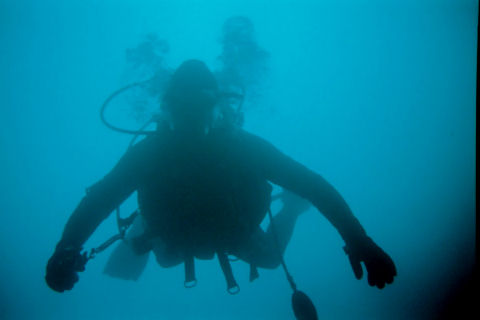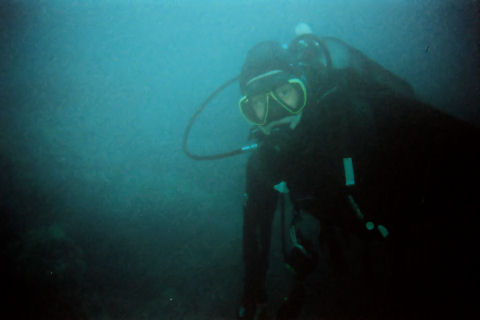While there are plenty of dive sites along the rugged coast of the Costa Brava, some of the best dive spots are located at the Medes Islands, off Estartit, and Cap de Creus. Scuba diving is massively popular during summer and both areas are designated natural parks where it is forbidden to remove anything from the seabed.

The Medes Islands
The Medes were at one time popular among divers harvesting coral, but since a ban was enforced some 20 or more years ago the coral has grown back spectacularly.
Located a mile off the popular beach resort, the archipelago consists of seven islands with a large number of dive sites. Some of these go down to around 50 metres, while others are in the 20-25 metre range.
There are also cave systems to explore, although since they are quite open they require nothing in the way of special equipment.
One thing you may find on some of the cave dives – Dofi Sud is one particular dive where you’ll often encounter a number of huge groupers. The fish are well over a metre in length and completely tame; they’ll often follow divers around on the dive and they get so close you can reach out and touch them. Amazing.
The number of dive boats is strictly controlled into the area and there is an additional tax charged for diving in the area, which will be included in the cost of a boat dive.
Dive centres in Estartit
Five or six dive centres in Estartit vie for business with twice or more daily trips to the islands and they are well organised with a shared bottle refill facility. This makes life quite a bit easier than having to lug an air tank from the dive centre to the quayside, although the dive centres are all pretty close by.
The boats are all well appointed, instructions will often be given in Catalan (depending on the nationality of the dive centre operators) and Spanish, but French is also common as well as English. They tend to have maps of the area giving an idea of the layout.
L’Escala
There are a number of dive operators also in nearby l’Escala. While most of the dives they offer are to local dive sites – and there are plenty around l’Escala – they also offer two or three trips to the Medes each week too. You’ll need to find out what they are offering at any particular time.
Cap de Creus
While the sandy coastline between l’Escala and Roses is great for beach lovers, there is nothing there in the way of diving until you get to Roses. However, Cap de Creus has several dive centres and, as another protected zone, is some spectacular diving.

Depending on the exact dive site, depths reach in excess of 40 metres, and currents can come up out of nowhere; I remember on one particular occasion, when after diving to 40 metres at a site called Massa d’Or, when the current came up suddenly while making a safety stop. We had to cling onto the rocks to avoid drifting too far as we weren’t yet close enough to the line on which to ascend. It doesn’t always happen, but you do need to be aware of it.
The visibility can be extraordinary though and just like the Medes Islands you may see some big groupers. I’ve dived at a number of sites here from both Port de la Selva and Llançà located on the north of Cap de Creus; I’ve also dived at a number of other sites on the south side of Cap de Creus from l’Escala. The trip is rather long, but the dives worthwhile.
And while I’ve never at gone out on a boat from the dive operators at Cadaqués, I’ve hired an air tank to dive at Es Caials. The remains of a torpedoed British merchant ship from the first world war lies on the bottom at 12-17 metres and the site is sheltered from the northerly Tramuntana, which can otherwise stop dive centres from sending out dive boats.
While there is not much left of the wreck, the site is good for an explore although you do need to be careful about boat traffic while entering and exiting the water as you’ll be on a similar path.
Learning to dive
All dive centres offer courses from PADI and other major dive associations during the summer. You can easily qualify within a week for your basic certification, which includes closed water practice and theory prior to venturing into the open water.

